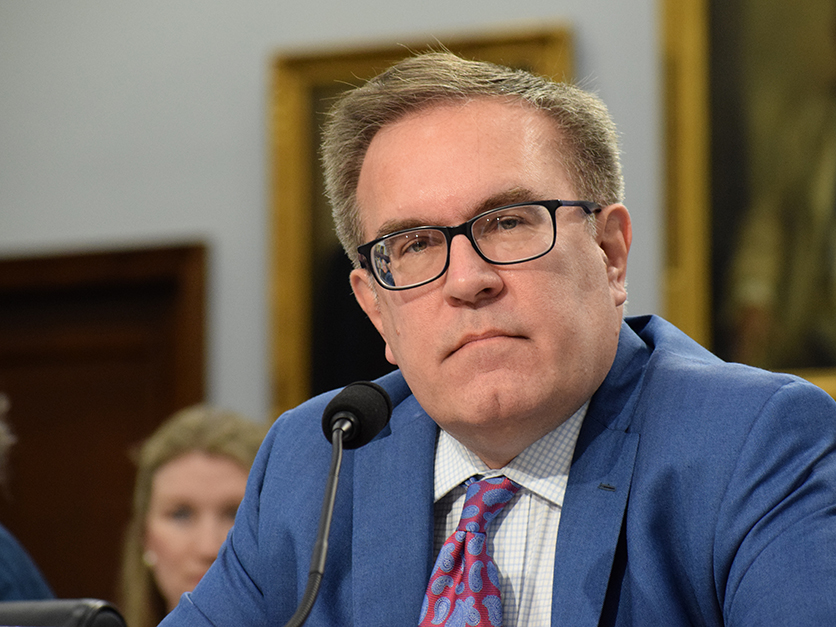A pair of Environmental Protection Agency propositions on biofuels policy would have differing ramifications for the sector, industry groups argued Friday.
The two proposals would separately address labeling of E15 – a fuel blend containing 15% ethanol – and take comment on waiving the nation’s biofuel mandate for the 2019 and 2020 compliance years. The pair are part of a flurry of items expected to be announced by the agency early Friday afternoon.
In regulatory documentation announcing the comment period for the general waiver, EPA pointed to requests from refineries and governors of “several states” petitioning the agency to exercise its “general waiver authority on the basis of severe economic harm.”
Growth Energy CEO Emily Skor called the waiver request an “offensive attempt by refiners to avoid their biofuel blending obligations.”
It’s also an attempt that is coming too late in the tenure of the Trump administration to give current EPA Administrator Andrew Wheeler any say in its ultimate outcome; Skor said she feels comfortable with how the Biden administration would handle the issue.
“Given President-elect Biden’s commitments on the campaign trail, we‘re confident his incoming team will uphold the integrity of the RFS and reject these oil-backed waiver requests before rural recovery is derailed,” she said. “We’ve seen the courts reject this kind of abuse before and urge the incoming administration to ensure refiners meet their blending obligations.”
Geoff Cooper, president and CEO of the Renewable Fuels Association, said the waiver petitions “cannot succeed because EPA has no authority to waive RFS volumes unless the petitioners show that the RFS itself is the cause of the ‘sever economic harm’ to a state, region, or the nation.
“Such a showing would be impossible, especially because the renewable fuel blending requirements have already adjusted lower in tandem with COVID-related changes in gasoline and diesel consumption,” he added. “In reality, the general waiver requests submitted to EPA come nowhere close to satisfying the well-defined statutory criteria and requirements established for requesting a waiver.”
The E15 proposal is expected to be published in the Federal Register on Tuesday, one day before President-elect Joe Biden is inaugurated. In its proposal, EPA suggests to either “modify the E15 label or remove the label requirement entirely” and also seeks comment on “whether state and local governments may be preempted from requiring different labels on fuel dispensers.”
The agency also suggests modification of Underground Storage Tank regulations to “grant certain allowances for compatibility demonstration for storage or ethanol blends” and proposes “compatibility requirements for future UST installations or component replacements that would ensure compatibility with higher blends of ethanol.”
Interested in more news on farm programs, trade and rural issues? Sign up for a four-week free trial to Agri-Pulse. You’ll receive our content - absolutely free - during the trial period.
Biofuel groups welcomed the E15 news.
Cooper said RFA has “long supported reforms and changes to the E15 pump label, which has deterred American drivers from using the lower-carbon, lower-cost, more-efficient E15 blend. We also agree that EPA’s current regulations regarding the compatibility of underground storage tanks should be revisited and we are pleased to see that issue being addressed in this proposal.”
Skor called the move a “first step toward removing onerous labeling and underground tank requirements and expanding access to E15 for American drivers.”
EPA also released an anti-backsliding study where it determined “no additional measures are necessary pursuant to (the) Clean Air Act” to mitigate the “adverse air quality impacts of the renewable fuel volumes” required under the law and formally announced a proposal to push back 2019 and 2020 Renewable Fuel Standard compliance to Nov. 30, 2021, and June 1, 2022.
Refineries are pushing for flexibility in RFS requirements. Geoff Moody, vice president of government relations for the American Fuel and Petrochemical Manufacturers, said “with the tremendous uncertainty around annual RFS volumes and other aspects of the program, it is prudent to extend compliance deadlines to allow companies to better manage their compliance strategies.”
This story will be updated with additional reaction.
For more news, go to www.Agri-Pulse.com.


